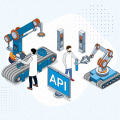AI models are trained using natural language processing (NLP) algorithms to analyze text and extract relevant information from it. The second type of AI service is machine learning models, which can be used for a wide variety of objectives, from automation tasks to complex predictive analysis. This AI service can be offered as a machine learning framework or as a complete machine learning service. Preparation tools make AIaaS integration more convenient for users, since they don't have to convert their data to the format required by the AI model as input.
This data can be used internally to train AI models and can also be provided by data providers as service providers at the request of users through data APIs or web interfaces with detailed authentication and authorization controls and pricing models. Cloud-based AI infrastructure services can counteract these problems by allowing efficient data storage and exchange of a large amount of AI data and their respective models. Inference as a service are often black box systems and offer little or even no means of customizing the AI model or the underlying data sets. In addition, training data and configured AI models can be more easily shared between different users if necessary, reducing redundancies and encouraging the general availability of AI models. An AI as a Service (PaaS) platform typically includes data management, model training, and inference deployment.
For example, Azure ML Studio offers a set of pre-designed examples and starter codes; C3 — AI Suite includes standard AI algorithms and models; and Dataiku provides tools that allow data scientists, data analysts and AI developers to work together. By identifying outliers in the data, AI knows what customer feedback is considered important and can modify them as needed. Existing research has begun to propose several approaches to protect people's privacy when training and operating an AI in the cloud, such as training AI models with encrypted data, making encrypted predictions, and returning predictions in encrypted form. Big data will continue to grow as AI becomes a more viable option for automating more tasks and AI becomes a broader field as more data becomes available for learning and analysis. Central data warehouses also allow for fast reading and writing AI algorithms and avoid large scale data redundancies. For example, several AI algorithms use a shared set of training data, which saves time and resources. Like other types of AI software services, MLAAs emerged to provide (expert) users with many features and customization options.
Interoperable AIaaS should allow data to be moved securely and efficiently between AIaaS providers and allow applications to be ported from one AI service to another. Mell and Grance 201, but AI infrastructures also store data relevant to the training and inference of AI models and provide appropriate data storage and exchange technologies, and the respective management processes. The most prominent and frequently used types of AIaaS are AI software services, which are ready-to-use applications or basic components. By leveraging these services, businesses can access powerful tools that enable them to quickly develop sophisticated applications that leverage artificial intelligence capabilities without having to invest in expensive hardware or software.











